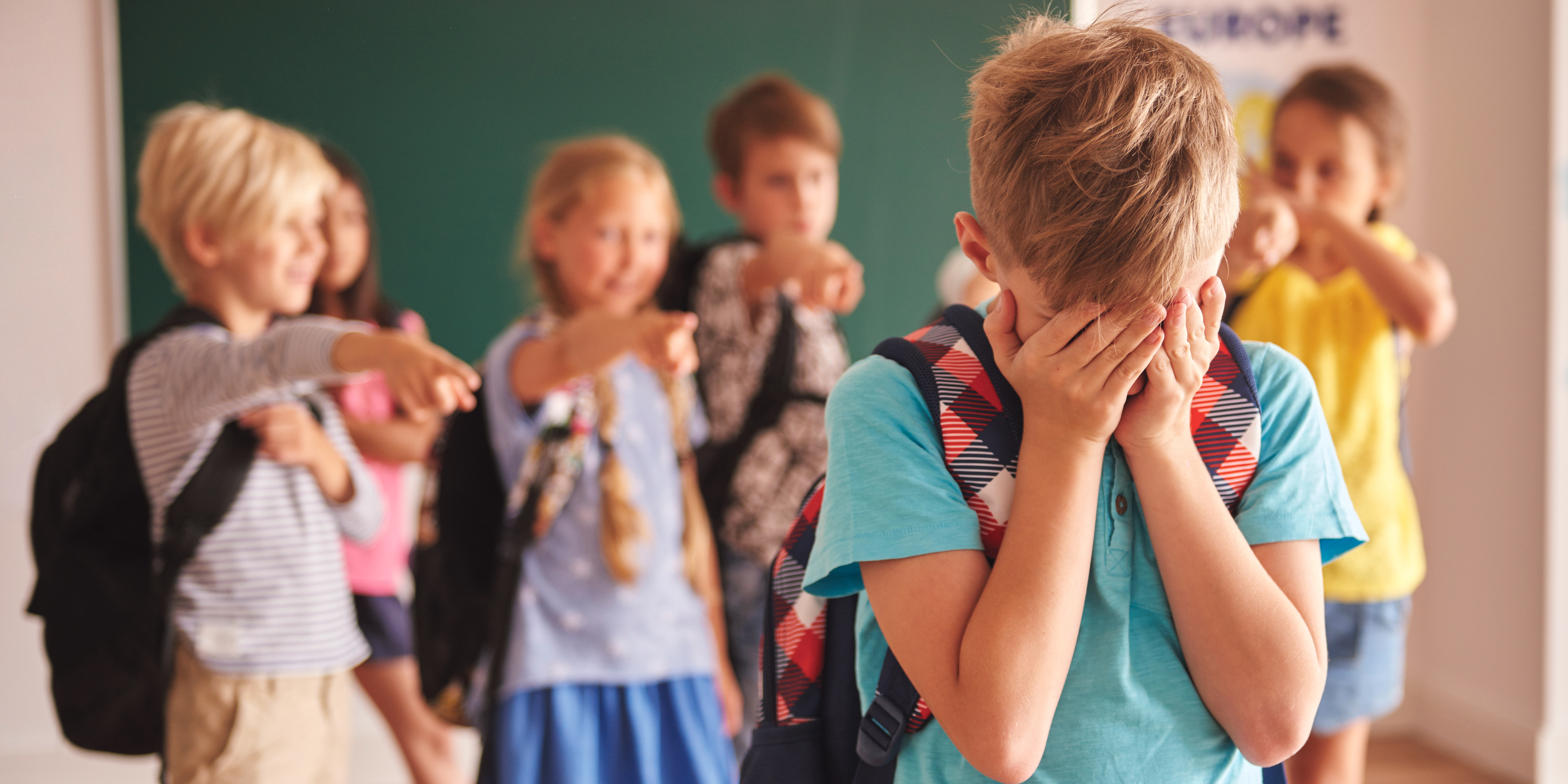All Article Properties:
{
"objectType": "Article",
"id": "2754587",
"signature": "Article:2754587",
"url": "https://prod.dailymaverick.co.za/article/2025-06-09-empowering-schools-and-parents-with-strategies-to-combat-bullying-and-foster-resilience-in-pupils/",
"shorturl": "https://www.dailymaverick.co.za/article/2754587",
"slug": "empowering-schools-and-parents-with-strategies-to-combat-bullying-and-foster-resilience-in-pupils",
"contentType": {
"id": "1",
"name": "Article",
"slug": "article",
"editor": "default"
},
"views": 0,
"comments": 0,
"preview_limit": null,
"rating": 0,
"excludedFromGoogleSearchEngine": 0,
"status": "publish",
"title": "Empowering schools and parents with strategies to combat bullying and foster resilience in pupils",
"firstPublished": "2025-06-09 12:48:30",
"lastUpdate": "2025-06-09 12:48:32",
"categories": [
{
"id": "29",
"name": "South Africa",
"signature": "Category:29",
"slug": "south-africa",
"typeId": {
"typeId": "1",
"name": "Daily Maverick",
"slug": "",
"includeInIssue": "0",
"shortened_domain": "",
"stylesheetClass": "",
"domain": "prod.dailymaverick.co.za",
"articleUrlPrefix": "",
"access_groups": "[]",
"locale": "",
"preview_limit": null
},
"parentId": null,
"parent": [],
"image": "",
"cover": "",
"logo": "",
"paid": "0",
"objectType": "Category",
"url": "https://prod.dailymaverick.co.za/category/south-africa/",
"cssCode": "",
"template": "default",
"tagline": "",
"link_param": null,
"description": "Daily Maverick is an independent online news publication and weekly print newspaper in South Africa.\r\n\r\nIt is known for breaking some of the defining stories of South Africa in the past decade, including the Marikana Massacre, in which the South African Police Service killed 34 miners in August 2012.\r\n\r\nIt also investigated the Gupta Leaks, which won the 2019 Global Shining Light Award.\r\n\r\nThat investigation was credited with exposing the Indian-born Gupta family and former President Jacob Zuma for their role in the systemic political corruption referred to as state capture.\r\n\r\nIn 2018, co-founder and editor-in-chief Branislav ‘Branko’ Brkic was awarded the country’s prestigious Nat Nakasa Award, recognised for initiating the investigative collaboration after receiving the hard drive that included the email tranche.\r\n\r\nIn 2021, co-founder and CEO Styli Charalambous also received the award.\r\n\r\nDaily Maverick covers the latest political and news developments in South Africa with breaking news updates, analysis, opinions and more.",
"metaDescription": "",
"order": "0",
"pageId": null,
"articlesCount": null,
"allowComments": "1",
"accessType": "freecount",
"status": "1",
"children": [],
"cached": true
},
{
"id": "1825",
"name": "Maverick Life",
"signature": "Category:1825",
"slug": "maverick-life",
"parentId": null,
"parent": [],
"image": "",
"cover": "",
"logo": "",
"paid": "0",
"objectType": "Category",
"url": "https://prod.dailymaverick.co.za/category/maverick-life/",
"cssCode": "",
"template": "default",
"tagline": "",
"link_param": null,
"description": "",
"metaDescription": "",
"order": "0",
"pageId": null,
"articlesCount": null,
"allowComments": "1",
"accessType": "freecount",
"status": "1",
"children": [],
"cached": true
},
{
"id": "341015",
"name": "DM168",
"signature": "Category:341015",
"slug": "dm168",
"parentId": null,
"parent": [],
"image": "",
"cover": "",
"logo": "",
"paid": "0",
"objectType": "Category",
"url": "https://prod.dailymaverick.co.za/category/dm168/",
"cssCode": "",
"template": "default",
"tagline": "",
"link_param": null,
"description": "",
"metaDescription": "",
"order": "0",
"pageId": null,
"articlesCount": null,
"allowComments": "1",
"accessType": "freecount",
"status": "1",
"children": [],
"cached": true
}
],
"access_groups": [],
"access_control": false,
"counted_in_paywall": true,
"content_length": 7428,
"contents": "<p><span style=\"font-weight: 400;\">There are many different definitions and understandings of what bullying is. I like this one: “Bullying happens when one person or a group of people tries to upset another person by saying nasty or hurtful things to him or her again and again. Sometimes bullies hit or kick people or force them to hand over money; sometimes they tease them again and again.”</span></p><p><span style=\"font-weight: 400;\">The person who is being bullied finds it difficult to stop it happening and worries it will happen again. A young person can be a perpetrator, a victim, or both.</span></p><p><span style=\"font-weight: 400;\">Bullying includes physical, psychological, social or educational harm. Common types of bullying include hitting, kicking and tripping; name-calling and teasing; and spreading rumours, leaving the victim out of the group, or damaging their property. There is also electronic or cyberbullying.</span></p><p><span style=\"font-weight: 400;\">In a January Psychology Today article by Arthur Maerlender and Patricia Gail Bray, they point out that “bullying behaviour is complex in its tactics”. They explain that bullies often use multiple tactics, with “acts of subtle aggressive ‘prosocial’ behaviour to enhance their position by acting in public and making the victim dependent and unable to reciprocate”.</span></p><p><span style=\"font-weight: 400;\">Is bullying a problem to worry about? Chinese researchers Zhui-Ying Han, Zi-Ting Ye and Bao-Liang Zhong, writing in the journal Translational Pediatrics, report on their systematic review that focused on school bullying and its association with mental health problems among adolescents.</span></p><p><span style=\"font-weight: 400;\">They conclude that a significant percentage — about 10% to 30% — of adolescents worldwide are victims of school bullying. An international study of 151,184 schoolgoing students in 40 countries found that 28.7% reported being bullied for at least one day. The highest bullying victimisation rate is in the age group 11 to 13 years.</span></p><p><span style=\"font-weight: 400;\">Han, Ye and Zhong observed that the negative mental health impact of bullying in adolescents is profound and affects not only victims, but bullies and bystanders. This has short- and long-term consequences such as anxiety, depression, substance abuse and suicidal behaviours.</span></p><p><span style=\"font-weight: 400;\">They argue that the effects do not fade with time; former victims face lifelong challenges including higher rates of adult anxiety, depression, substance use disorders and even interpersonal violence or criminal behaviour.</span></p><p><span style=\"font-weight: 400;\">Bullies can also suffer long-term repercussions — studies have linked their aggressive behaviour to increased risks of antisocial personality disorder, addiction, criminality and mental health issues.</span></p><p><span style=\"font-weight: 400;\">Bystanders can experience vicarious trauma from witnessing bullying, which can also lead to issues such as anxiety, depression, sleep disturbances and higher rates of psychological distress.</span></p><p><span style=\"font-weight: 400;\">What can schools do?</span></p><p><strong>Codes of conduct</strong></p><p><span style=\"font-weight: 400;\">Before schools embark on awareness campaigns or engage anti-bullying experts, they need policies in place that ensure the safety of students. Codes of conduct must be communicated to and understood by everyone in the school community.</span></p><p><span style=\"font-weight: 400;\">Schools need to be secured and made safer with functional fences and gates and controlled access. Litter needs to be cleared away, the classroom swept, cracked windows replaced and broken doors and handles repaired. If there’s a prevalence of drugs and weapons, regular, unannounced searches should be conducted.</span></p><p><span style=\"font-weight: 400;\">Adults must supervise students at school, and they need to be visible in its high-risk areas. They must take an active interest and make sure safety is a concern that is consistently addressed.</span></p><p><span style=\"font-weight: 400;\">Any acts of aggression and violence need to be dealt with. Rule-breaking and “minor” violations should not be ignored, and students need to understand that violent or aggressive behaviour will not be tolerated. The consequence of breaking the rules also needs to be understood by everyone. More importantly, good behaviour needs to be modelled and celebrated.</span></p><p><span style=\"font-weight: 400;\">Teachers need to model respectful behaviour to students in how they themselves act as well as how they treat their students. They need to show students that there are consequences for bad behaviour and breaking the rules. More importantly, schools need to do away with many of their own practices that foster violence, such as corporal punishment.</span></p><p><span style=\"font-weight: 400;\">Maerlender and Gail Bray note that there is good evidence that resiliency-focused instruction in coping skills and effective social communication is a promising approach for reducing a range of disruptive behaviours in schools.</span></p><p><span style=\"font-weight: 400;\">These programmes can improve school engagement and climate, interpersonal relationships, wellbeing and academic achievement. They call for the development of resilience skills, coping skills and effective social communication to reduce victimisation. The authors point out that schools should not be left to fend for themselves, but ought to have access to expertise and clinical resources to support their mission.</span></p><p><span style=\"font-weight: 400;\">Since teaching and learning are central, and student performance is a measure for students of self-worth; each student needs to be assisted to achieve the best they can. They also need to know that the school cares about their achievement.</span></p><p><span style=\"font-weight: 400;\">Wherever possible, the support of parents and guardians must be sought to make sure that they know what their children are up to at school. When necessary, they should be called in to discuss the children’s performance and behaviour.</span></p><p><span style=\"font-weight: 400;\">Students should be involved in solving problems and preventing violence. They should be encouraged to share their ideas and concerns. In some schools, students sign pledges against violence, which can highlight personal responsibility in reducing violence.</span></p><p><b>What can parents do about bullying?</b></p><p><span style=\"font-weight: 400;\">Most children don’t talk to their parents about school bullying. Look out for possible signs of bullying such as changes in sleep patterns, increased bed-wetting or not wanting to go to school.</span></p><p><span style=\"font-weight: 400;\">When your child does speak to you, listen carefully and ask them what role they would like you to play in solving the problem. Assure them you will handle the situation sensitively and with a view to protecting them from further harm.</span></p><p><span style=\"font-weight: 400;\">Contact the school to report the bullying. Don’t contact the other child’s parents directly, as this can escalate the issue and take away your child’s power. Ask the school to investigate the issue and how long it will take to respond. You can ask that your child’s identity is not shared to protect them from further retaliation.</span></p><p><span style=\"font-weight: 400;\">Help your child to develop interpersonal skills that can help them navigate instances of bullying. These include self-regulation, social skills and problem-solving. It can help your child to stay calm and not appear distressed. Help your child identify safe spaces, friends and adults they can turn to for support. They need to know that they have people they can depend on who care for them.</span></p><p><span style=\"font-weight: 400;\">The most recent research findings suggest that bullying is not just a fleeting childhood challenge, but a systemic problem that can have a lifelong impact.</span></p><p><span style=\"font-weight: 400;\">Dealing with bullying effectively requires a holistic approach that prioritises intervention for bullies, mental health support for victims and developing schools where empathy and accountability prevent harm. Ignoring the crisis can leave communities vulnerable to cycles of trauma that go beyond the classroom. </span><b>DM</b></p><p><i><span style=\"font-weight: 400;\">Dr Mark Potterton is the primary school principal of Sacred Heart College and the director of the Three2Six Refugee Children’s Project. </span></i></p><p><i><span style=\"font-weight: 400;\">This story first appeared in our weekly Daily Maverick 168 newspaper, which is available countrywide for R35.</span></i></p><p><img loading=\"lazy\" class=\"alignnone size-full wp-image-2749959\" src=\"https://www.dailymaverick.co.za/wp-content/uploads/2025/06/DM-06062025-001-scaled.jpg\" alt=\"\" width=\"1947\" height=\"2560\" /></p>",
"teaser": "How to prevent school being at the heart of the bullying scourge %%page%%",
"externalUrl": "",
"sponsor": null,
"authors": [
{
"id": "271070",
"name": "Mark Potterton",
"image": "https://cdn.dailymaverick.co.za/dailymaverick/wp-content/uploads/2022/08/EYYEQ-kX0AEt-bC.jpeg",
"url": "https://www.dailymaverick.co.za/author/mark-potterton/",
"editorialName": "mark-potterton",
"department": "",
"name_latin": ""
}
],
"description": "Bullies at school harm their victims, the bystanders and themselves.",
"keywords": [
{
"type": "Keyword",
"data": {
"keywordId": "4191",
"name": "Education",
"url": "https://www.dailymaverick.co.za/article_tag//",
"slug": "education",
"description": "",
"articlesCount": 0,
"replacedWith": null,
"display_name": "Education",
"translations": null,
"collection_id": null,
"image": ""
}
},
{
"type": "Keyword",
"data": {
"keywordId": "8951",
"name": "Mental health",
"url": "https://www.dailymaverick.co.za/article_tag//",
"slug": "mental-health",
"description": "",
"articlesCount": 0,
"replacedWith": null,
"display_name": "Mental health",
"translations": null,
"collection_id": null,
"image": ""
}
},
{
"type": "Keyword",
"data": {
"keywordId": "10465",
"name": "Depression",
"url": "https://www.dailymaverick.co.za/article_tag//",
"slug": "depression",
"description": "",
"articlesCount": 0,
"replacedWith": null,
"display_name": "Depression",
"translations": null,
"collection_id": null,
"image": ""
}
},
{
"type": "Keyword",
"data": {
"keywordId": "10938",
"name": "Suicide",
"url": "https://www.dailymaverick.co.za/article_tag//",
"slug": "suicide",
"description": "",
"articlesCount": 0,
"replacedWith": null,
"display_name": "Suicide",
"translations": null,
"collection_id": null,
"image": ""
}
},
{
"type": "Keyword",
"data": {
"keywordId": "10941",
"name": "Bullying",
"url": "https://www.dailymaverick.co.za/article_tag//",
"slug": "bullying",
"description": "",
"articlesCount": 0,
"replacedWith": null,
"display_name": "Bullying",
"translations": null,
"collection_id": null,
"image": ""
}
},
{
"type": "Keyword",
"data": {
"keywordId": "12151",
"name": "Corporal punishment",
"url": "https://www.dailymaverick.co.za/article_tag//",
"slug": "corporal-punishment",
"description": "",
"articlesCount": 0,
"replacedWith": null,
"display_name": "Corporal punishment",
"translations": null,
"collection_id": null,
"image": ""
}
},
{
"type": "Keyword",
"data": {
"keywordId": "15109",
"name": "Substance abuse",
"url": "https://www.dailymaverick.co.za/article_tag//",
"slug": "substance-abuse",
"description": "",
"articlesCount": 0,
"replacedWith": null,
"display_name": "Substance abuse",
"translations": null,
"collection_id": null,
"image": ""
}
},
{
"type": "Keyword",
"data": {
"keywordId": "15866",
"name": "Cyberbullying",
"url": "https://www.dailymaverick.co.za/article_tag//",
"slug": "cyberbullying",
"description": "",
"articlesCount": 0,
"replacedWith": null,
"display_name": "Cyberbullying",
"translations": null,
"collection_id": null,
"image": ""
}
},
{
"type": "Keyword",
"data": {
"keywordId": "20664",
"name": "schooling",
"url": "https://www.dailymaverick.co.za/article_tag//",
"slug": "schooling",
"description": "",
"articlesCount": 0,
"replacedWith": null,
"display_name": "schooling",
"translations": null,
"collection_id": null,
"image": ""
}
},
{
"type": "Keyword",
"data": {
"keywordId": "62940",
"name": "Anxiety",
"url": "https://www.dailymaverick.co.za/article_tag//",
"slug": "anxiety",
"description": "",
"articlesCount": 0,
"replacedWith": null,
"display_name": "Anxiety",
"translations": null,
"collection_id": null,
"image": ""
}
},
{
"type": "Keyword",
"data": {
"keywordId": "388828",
"name": "Mark Potterton",
"url": "https://www.dailymaverick.co.za/article_tag//",
"slug": "mark-potterton",
"description": "",
"articlesCount": 0,
"replacedWith": null,
"display_name": "Mark Potterton",
"translations": null,
"collection_id": null,
"image": ""
}
},
{
"type": "Keyword",
"data": {
"keywordId": "421789",
"name": "DM 168",
"url": "https://www.dailymaverick.co.za/article_tag//",
"slug": "dm-168",
"description": "",
"articlesCount": 0,
"replacedWith": null,
"display_name": "DM 168",
"translations": null,
"collection_id": null,
"image": ""
}
}
],
"short_summary": null,
"source": null,
"related": [],
"options": [],
"attachments": [
{
"id": "3078533",
"name": "P27 Potterton Bullying",
"description": "Bullying occurs across physical, verbal and cyber platforms among students. (Photo: Freepik)",
"focal": "50% 50%",
"width": 0,
"height": 0,
"url": "https://cdn.dailymaverick.co.za/dailymaverick/wp-content/uploads/2025/06/picture-showing-children-violence-school.jpg",
"transforms": [
{
"x": "200",
"y": "100",
"url": "https://cdn.dailymaverick.co.za/i/0ssCyHcf1C3AzKVxQX57IAFzqFQ=/200x100/smart/filters:strip_exif()/file/dailymaverick/wp-content/uploads/2025/06/picture-showing-children-violence-school.jpg"
},
{
"x": "450",
"y": "0",
"url": "https://cdn.dailymaverick.co.za/i/VljLO1RQezECqD1Z0ImZWQO4bV4=/450x0/smart/file/dailymaverick/wp-content/uploads/2025/06/picture-showing-children-violence-school.jpg"
},
{
"x": "800",
"y": "0",
"url": "https://cdn.dailymaverick.co.za/i/fFq3sLOQJCrjDZbLPnWzZv0h97s=/800x0/smart/filters:strip_exif()/file/dailymaverick/wp-content/uploads/2025/06/picture-showing-children-violence-school.jpg"
},
{
"x": "1200",
"y": "0",
"url": "https://cdn.dailymaverick.co.za/i/ygJiq9drO-FkiuBcqk4r4Yeha4U=/1200x0/smart/filters:strip_exif()/file/dailymaverick/wp-content/uploads/2025/06/picture-showing-children-violence-school.jpg"
},
{
"x": "1600",
"y": "0",
"url": "https://cdn.dailymaverick.co.za/i/TrPUmMHWHhIUOtQBGkv5ldYQIiQ=/1600x0/smart/filters:strip_exif()/file/dailymaverick/wp-content/uploads/2025/06/picture-showing-children-violence-school.jpg"
}
],
"url_thumbnail": "https://cdn.dailymaverick.co.za/i/0ssCyHcf1C3AzKVxQX57IAFzqFQ=/200x100/smart/filters:strip_exif()/file/dailymaverick/wp-content/uploads/2025/06/picture-showing-children-violence-school.jpg",
"url_medium": "https://cdn.dailymaverick.co.za/i/VljLO1RQezECqD1Z0ImZWQO4bV4=/450x0/smart/file/dailymaverick/wp-content/uploads/2025/06/picture-showing-children-violence-school.jpg",
"url_large": "https://cdn.dailymaverick.co.za/i/fFq3sLOQJCrjDZbLPnWzZv0h97s=/800x0/smart/filters:strip_exif()/file/dailymaverick/wp-content/uploads/2025/06/picture-showing-children-violence-school.jpg",
"url_xl": "https://cdn.dailymaverick.co.za/i/ygJiq9drO-FkiuBcqk4r4Yeha4U=/1200x0/smart/filters:strip_exif()/file/dailymaverick/wp-content/uploads/2025/06/picture-showing-children-violence-school.jpg",
"url_xxl": "https://cdn.dailymaverick.co.za/i/TrPUmMHWHhIUOtQBGkv5ldYQIiQ=/1600x0/smart/filters:strip_exif()/file/dailymaverick/wp-content/uploads/2025/06/picture-showing-children-violence-school.jpg",
"type": "image"
}
],
"summary": "Research reveals that school bullying not only shatters the spirits of its victims but also leaves bullies and bystanders grappling with a lifetime of psychological baggage.",
"introduction": "<ul><li>Bullying is a complex issue, manifesting through physical, psychological, and social harm, with significant impacts on victims, perpetrators, and bystanders alike.</li><li>Research shows that 10% to 30% of adolescents globally experience school bullying, leading to severe mental health consequences like anxiety and depression.</li><li>Effective anti-bullying strategies in schools require clear codes of conduct, visible adult supervision, and a commitment to addressing all forms of aggression.</li><li>Resilience-focused programmes that teach coping and social communication skills are essential for mitigating bullying and fostering a positive school environment.</li></ul>",
"template_type": null,
"dm_custom_section_label": "DM168, Maverick Life, South Africa",
"dm-key-theme": null,
"dm-article-theme": null,
"dm-user-need": null,
"dm-disable-comments": false,
"elements": [],
"seo": {
"search_title": "How to prevent school being at the heart of the bullying scourge %%page%%",
"search_description": "Bullies at school harm their victims, the bystanders and themselves.",
"social_title": "Empowering schools and parents with strategies to combat bullying and foster resilience in pupils",
"social_description": "Bullies at school harm their victims, the bystanders and themselves.",
"social_image": ""
},
"time_to_read": 261,
"cached": true
} 




 Bullying occurs across physical, verbal and cyber platforms among students. (Photo: Freepik)
Bullying occurs across physical, verbal and cyber platforms among students. (Photo: Freepik) 